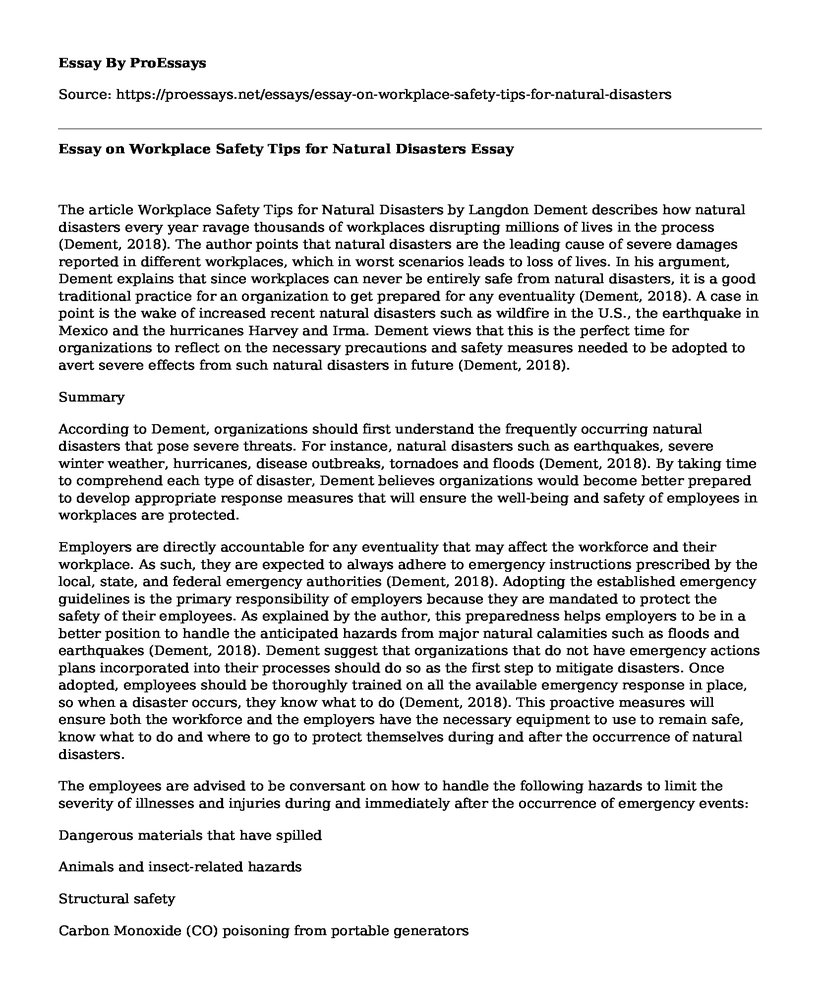The article Workplace Safety Tips for Natural Disasters by Langdon Dement describes how natural disasters every year ravage thousands of workplaces disrupting millions of lives in the process (Dement, 2018). The author points that natural disasters are the leading cause of severe damages reported in different workplaces, which in worst scenarios leads to loss of lives. In his argument, Dement explains that since workplaces can never be entirely safe from natural disasters, it is a good traditional practice for an organization to get prepared for any eventuality (Dement, 2018). A case in point is the wake of increased recent natural disasters such as wildfire in the U.S., the earthquake in Mexico and the hurricanes Harvey and Irma. Dement views that this is the perfect time for organizations to reflect on the necessary precautions and safety measures needed to be adopted to avert severe effects from such natural disasters in future (Dement, 2018).
Summary
According to Dement, organizations should first understand the frequently occurring natural disasters that pose severe threats. For instance, natural disasters such as earthquakes, severe winter weather, hurricanes, disease outbreaks, tornadoes and floods (Dement, 2018). By taking time to comprehend each type of disaster, Dement believes organizations would become better prepared to develop appropriate response measures that will ensure the well-being and safety of employees in workplaces are protected.
Employers are directly accountable for any eventuality that may affect the workforce and their workplace. As such, they are expected to always adhere to emergency instructions prescribed by the local, state, and federal emergency authorities (Dement, 2018). Adopting the established emergency guidelines is the primary responsibility of employers because they are mandated to protect the safety of their employees. As explained by the author, this preparedness helps employers to be in a better position to handle the anticipated hazards from major natural calamities such as floods and earthquakes (Dement, 2018). Dement suggest that organizations that do not have emergency actions plans incorporated into their processes should do so as the first step to mitigate disasters. Once adopted, employees should be thoroughly trained on all the available emergency response in place, so when a disaster occurs, they know what to do (Dement, 2018). This proactive measures will ensure both the workforce and the employers have the necessary equipment to use to remain safe, know what to do and where to go to protect themselves during and after the occurrence of natural disasters.
The employees are advised to be conversant on how to handle the following hazards to limit the severity of illnesses and injuries during and immediately after the occurrence of emergency events:
Dangerous materials that have spilled
Animals and insect-related hazards
Structural safety
Carbon Monoxide (CO) poisoning from portable generators
Electrical hazards from water-related shorts
Fire prevention
Also, in this article, Dement has offered comprehensive guidelines on how employees should address high incidences of illnesses that often break out mainly because of standing water particularly after a flood or natural hurricane disasters (Dement, 2018). According to the author, some of the ways that should be adopted to minimize cases of disease outbreaks include:
Sensitizing employees to become aware of infectious diseases
Preventing CO poisoning when the gas leaks out
Avoiding mosquitoes to avert potential cases of malaria
Immediately getting medical treatment if an employee or an employer is injured or become sick
Becoming aware of the available immunizations and
Practicing good hygiene to limit contact with mildew, bacteria, mold, and viruses that cause different diseases
Conclusion
In conclusion, it is clear from this article that natural disasters cannot be accurately predicted when and where it will occur, but organizations have the mandate to plan and adopt the best possible proven emergency response measures to ensure the workplaces are safe to limit the potential severity of such calamities.
References
Dement, L. (2018). Workplace safety tips for natural disasters - Knowledge at work. knowledge at work. Retrieved from https://www.ulehssustainability.com/blog/workplacesafety/workplace-safety-tips-for-natural-disasters/#sthash.GecTXtYB.dpbs
Cite this page
Essay on Workplace Safety Tips for Natural Disasters. (2021, Sep 01). Retrieved from https://proessays.net/essays/essay-on-workplace-safety-tips-for-natural-disasters
If you are the original author of this essay and no longer wish to have it published on the ProEssays website, please click below to request its removal:
- Vestibular Rehabilitation Essay
- Essay Sample on Epidemiology Aspect of Public Health
- Essay Example on Stop Smoking: Poster Encourages Ethical Behavior and Prevention
- Essay on Assisted Reproduction: Surrogacy, IVF and Designer Babies
- Correlation of Nursing Staff Overwork and Patient Safety: A Hypothesis - Essay Sample
- Civic Education in K-6 and 9th Grade: Essential for Effective Participation in Public Life - Essay Sample
- Suicide Rates - Report Example







